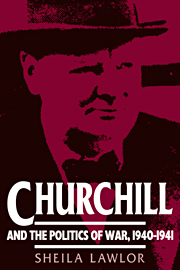Book contents
- Frontmatter
- Contents
- Acknowledgements
- List of abbreviations
- Introduction
- Retrospect
- Part 1 Churchill, the conservative party and the war
- Part 2 The Middle East, imperial defence and the Balkans (October to December 1940)
- 5 Churchill and the Middle East
- 6 Eden and the Middle East
- 7 Halifax and the Middle East
- 8 The military and the Middle East
- Part 3 The Greek Decision (January to March 1941)
- General conclusion
- Bibliography
- Index
6 - Eden and the Middle East
Published online by Cambridge University Press: 04 August 2010
- Frontmatter
- Contents
- Acknowledgements
- List of abbreviations
- Introduction
- Retrospect
- Part 1 Churchill, the conservative party and the war
- Part 2 The Middle East, imperial defence and the Balkans (October to December 1940)
- 5 Churchill and the Middle East
- 6 Eden and the Middle East
- 7 Halifax and the Middle East
- 8 The military and the Middle East
- Part 3 The Greek Decision (January to March 1941)
- General conclusion
- Bibliography
- Index
Summary
The background: May–September 1940
Throughout the summer, Eden appeared to be a strong protagonist of making good the deficiencies in the Middle East. The exigencies of the Battle of Britain did not deter him from making Wavell's case; or from despatching – and stating that he was doing so – parcels of reinforcement: additional supplies of ammunition in late July (when he also had plans for armoured cars and spares).
Wavell's visit and his tales of woe encouraged Eden to feel righteous. The deficiencies were, he thought, ‘shocking’, and they would ‘have to make him a parcel … and send it out soon’. Equipment shortages must be made good, the despatch of convoys and armoured reinforcements hastened. Wavell, he minuted Churchill, lacked ‘all the weapons which … ma[d]e up a modern fighting force’ – from … anti-tank and anti-aircraft weapons to guns and Brens. He pressed for plans to proceed for the despatch of the three armoured units and the ‘considerable consignment of equipment, especially guns’ which should follow ‘as quickly as practicable’; and for preparations for a September convoy of Australian and New Zealand forces, ‘or further armoured units’ or both.
Eden's position, therefore, was that of a persistent, continual advocate of more to the Middle East – whether specific parcels (named equipment, numbered troops), or reinforcements in general. ‘We must not let up on that continuous stream, however great our preoccupations here at home’, he wrote on 19 September.
- Type
- Chapter
- Information
- Churchill and the Politics of War, 1940–1941 , pp. 134 - 144Publisher: Cambridge University PressPrint publication year: 1994

